Mississippi Today
Meet five young Mississippians voting for the first time on Nov. 7
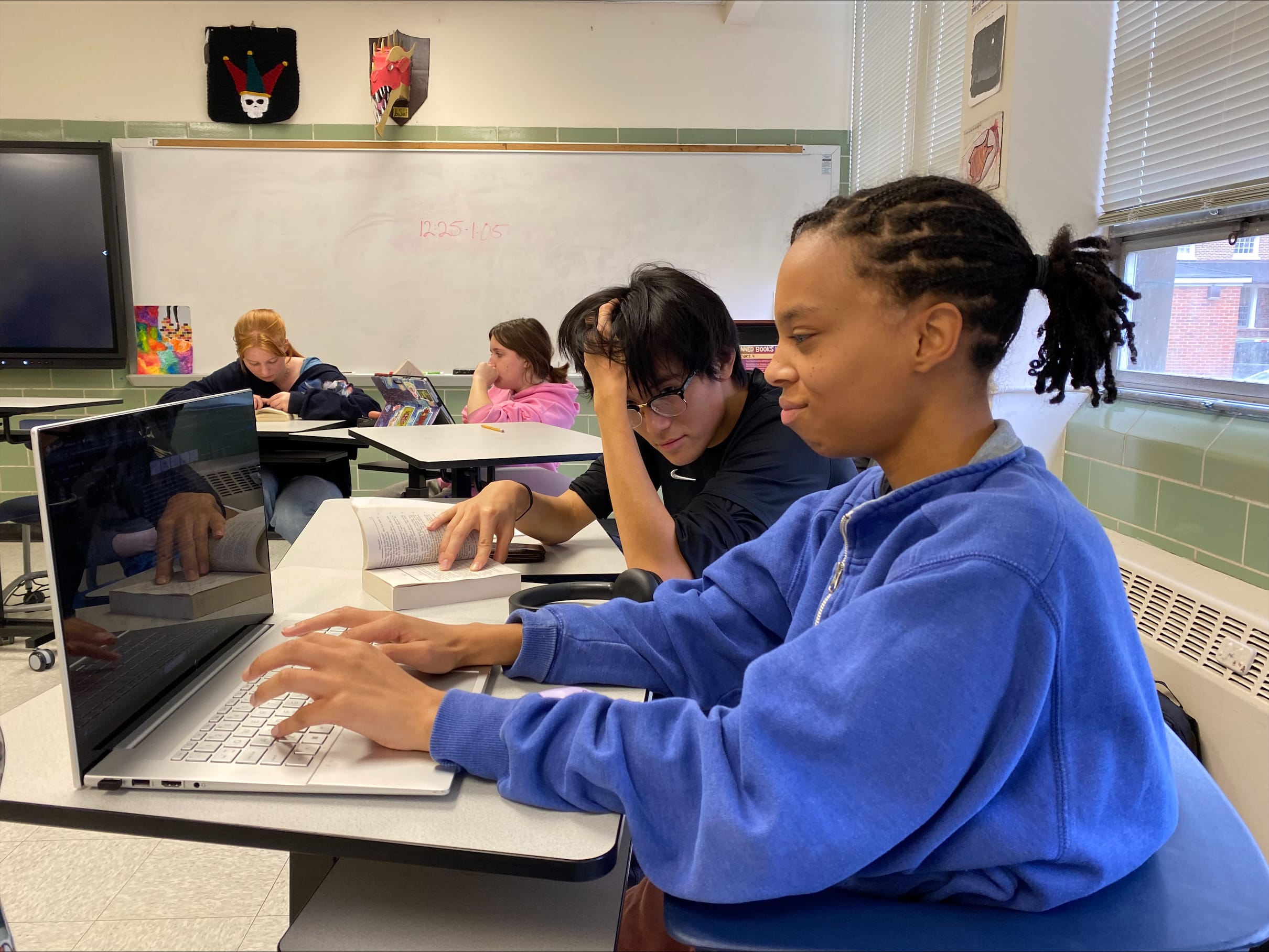
Taylor McGraw, an Oxford native who now lives in Jackson, is executive director and co-founder of The Bell, a nonprofit that supports the next generation of journalists. His writing has appeared in USA Today, The New York Daily News, The Hechinger Report and Narratively.
In last year’s midterm election, just 26% of 18-24 year-olds in Mississippi went to the polls. One political consultant estimates that just 19% in the same age group voted in the 2019 gubernatorial cycle.
Young Mississippians, many of whom have thoughts of leaving the state, are rarely prioritized by candidates in campaign events or messaging. This year’s statewide election features a governor’s race between Gov. Tate Reeves and Democratic challenger Brandon Presley — both of whom have campaigned on college campuses this year.
Presley has talked more directly with young voters about new ideas to keep young Mississippians home, while Reeves has focused more on trying to convince young voters that the state is, indeed, on the right track.
Ahead of the Nov. 7 election, I wanted to speak to young people around the state who are planning to vote this year for the first time. What issues are on their minds? What would they tell these candidates if they could? What, if anything, do they want to see change in their state?
The five young people I interviewed are not fully representative of their peers statewide. They are all enrolled in college or plan to attend college next year. They all attend or attended public high schools — including two who attend the Mississippi School for Mathematics and Science, a state-funded school for gifted students. Four consider themselves politically moderate or left-leaning.
Here’s what struck me as universal themes: All five were genuinely excited to cast a ballot this year. None of them expressed the political cynicism that I often hear from older adults. All five have deep affection for Mississippi and want to see it improve. None of them plan to live here long-term.
The following interviews have been edited for length and clarity.
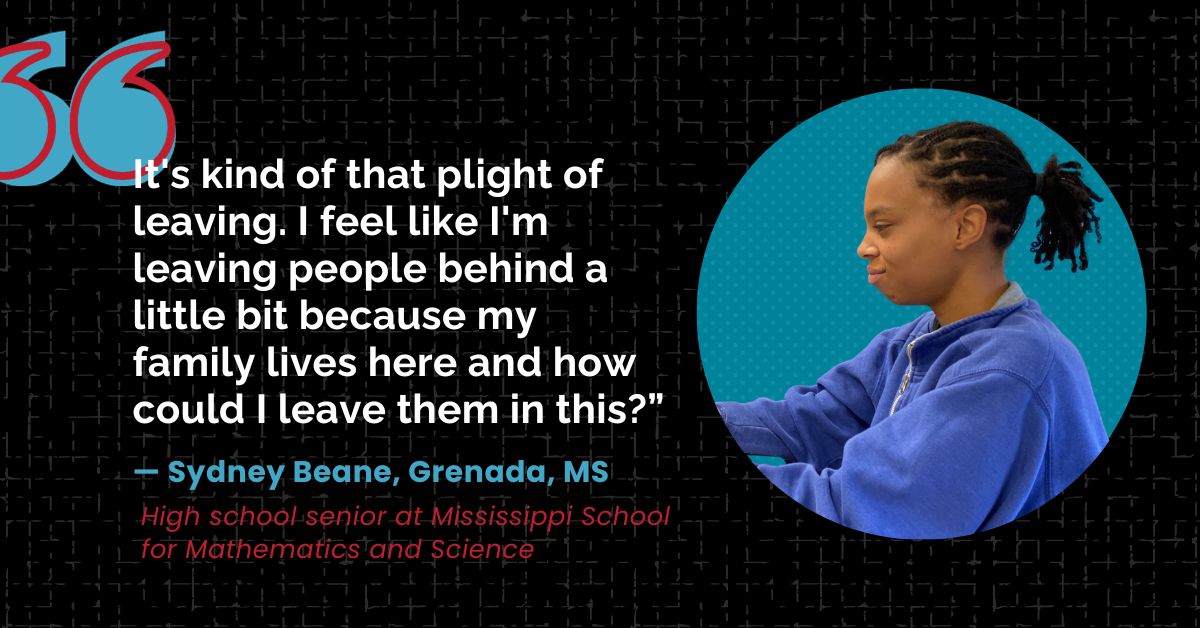
Taylor McGraw: Tell me about growing up in Grenada.
Sydney Beane: My hometown is pretty interesting. I have a different view of the culture there. I was the first Black person ever to be inducted in the history of the cotillion. And so I get to see these higher socioeconomic status type deals and listen to their politics and what they think. And then also, I’m close friends with people that would never get the chances to do things that I do.
Taylor: In terms of your politics, let’s say if there was a scale from 1 to 5 — 1 being as far left as you could get, 5 being as far right as you could get — where would you put yourself?
Sydney: Probably a clean 2.
Taylor: How did you land there?
Sydney: My upbringing. My parents are very traditional and religious, but they still taught me open mindedness. And then with social media and things like that, I’ve become more open minded than they are. I think coming to MSMS (Mississippi School for Mathematics and Science) changed it as well. Until I got here, I had never had a friend that was Asian or had a friend that went by they/them pronouns or that was transgender.
Taylor: What issues are on your mind as you prepare to vote for the first time?
Sydney: Women’s reproductive rights are really heavy on my mind this year. And then especially being a student going into college, the recent affirmative action debate is very looming. I used to have the idea of let’s go to a top 100, let’s go to Harvard, let’s go to Yale. Let’s do this. But ever since that change, it’s just been more in my face that, hey, it may be better if you go to a place where you’ll be accepted on the front end.
And then also economic issues are really heavy on my mind as I’m growing up and becoming a big girl. It’s like, okay, I’ve got to pay for college. It’s really hard to explain to older people. They’ll be like, “You can just take out loans for college.” And it’s like, “Mom, when you went to college, it was like $30,000 for all four years.” But if I were to go to a top 100 school, I’d be almost half a million dollars in debt if I didn’t get any type of support, which is, like, insane.
Audio: Listen to Sydney answer whether she plans to stay in Mississippi.
Taylor: Those issues all make sense given where you are in life. I’m curious how much research you’ve done on the candidates for governor and how your stances align or don’t align with those two guys.
Sydney: Mainly the thing that’s in my head is: Tate Reeves — not good; Brandon Presley, Democrat — good. That’s kind of what’s been put into my brain.
I listened to Brandon Presley speak in Grenada this summer, which was really interesting. The event was held in this prestigious hall. The main issues I heard him talk about were education and its funding. He talked about tax breaks. And he also talked a lot about the healthcare system and how a lot of our hospitals are going into disarray and how women in labor have to drive all the way to, like, Grenada or somewhere to have their child, which is really not good. But I don’t know… the whole culture of the event, I thought it was just really odd. Just us dining and talking. I thought people mainly were there because they wanted connections, not because they were worried about anything. There were Republican people there and they were like, I’d do anything to change where we are now. They were like, I’m actually willing to vote Democratic in order to get Tate Reeves out of office.
Taylor: Do you feel like Brandon Presley is not speaking to you as directly as he is to those Republicans to try to get them to come vote for him?
Sydney: Yeah, that’s totally where my mind is right now because, yeah, everything he was saying was pretty moderate, something that anyone from any party would agree with. It was very moderate.
Taylor: And I know you mentioned that reproductive rights was one of your important issues. Brandon Presley has said that he’s pro-life, so I’m curious how that sits with you.
Sydney: Oh, it doesn’t sit too well. Yeah, it’s really tough for me. I just remember when the first Supreme Court ruling happened, there was so much being fed, like doomsday-type things. Like, you need to stockpile Plan B and things like that. I accept that the Mississippi legislature will be pro-life, point blank. But yeah, I think it’s been really tough for a lot of young women in Mississippi.
Taylor: Is there anything that you like about Tate Reeves or is there anything that you’re curious to find out more about in terms of his positions?
Sydney: I think as a whole, Republican economics is very interesting. I kind of see it as a temptation, like the fruit in Eden. I totally can understand why companies or big businesses support Republican candidates simply because of their financial ideologies. I still see a lot of those views as wrong and immoral, but I can understand to some extent how alluring that is.
Taylor: If you had 30 minutes to sit down with the candidates, what would you tell them?
Sydney: That’s interesting because I’m not sure they would listen or understand what I was saying, so I would kind of see it as wasted breath. But if I were to say something to them, I would try to bring people with me. I would probably try to get them to see the humanity behind the people that they’re supposed to represent. I would want them to look and see my pay calculator for college. And then it’s like, I want you to meet my friend that goes by different pronouns than you agree with. I want you to meet my friends of different races that you may speak ill of or don’t represent in your politics.
Taylor: Do you want to settle down and live in Mississippi one day?
Sydney: It’s kind of polarizing within myself. My dream has been to go out of state for college. I’ve always seen it as kind of like a little escape. But there is heavy conversation about an intellectual flight out of Mississippi and how we have all of these issues and these plights and we complain. But it’s like if the people that are smart enough to change the problems, that are smart enough to recognize the problems, leave then that will never change. So it’s kind of that plight of leaving. I feel like I’m leaving people behind a little bit because my family lives here and how could I leave them in this?
Taylor: Are you proud to be from Mississippi?
Sydney: Yes, I am proud to be from Mississippi. I love Mississippi. I think it’s so mystical and alluring. It’s almost like a fairy tale, like a little, I don’t know, like a fiction story. Like it’s the setting of a novel. It’s the setting of a lot of novels, actually (laughs). But I just think it’s great because there’s so many little gems here. I’m so proud to be from Mississippi, and I’m proud of the progress and change we’ve made in recent years with our flag change and the taking down of many Confederate monuments. I know the one in my hometown is taken down. We’ve made so many changes and I think we should applaud ourselves for the changes and keep pushing forward.
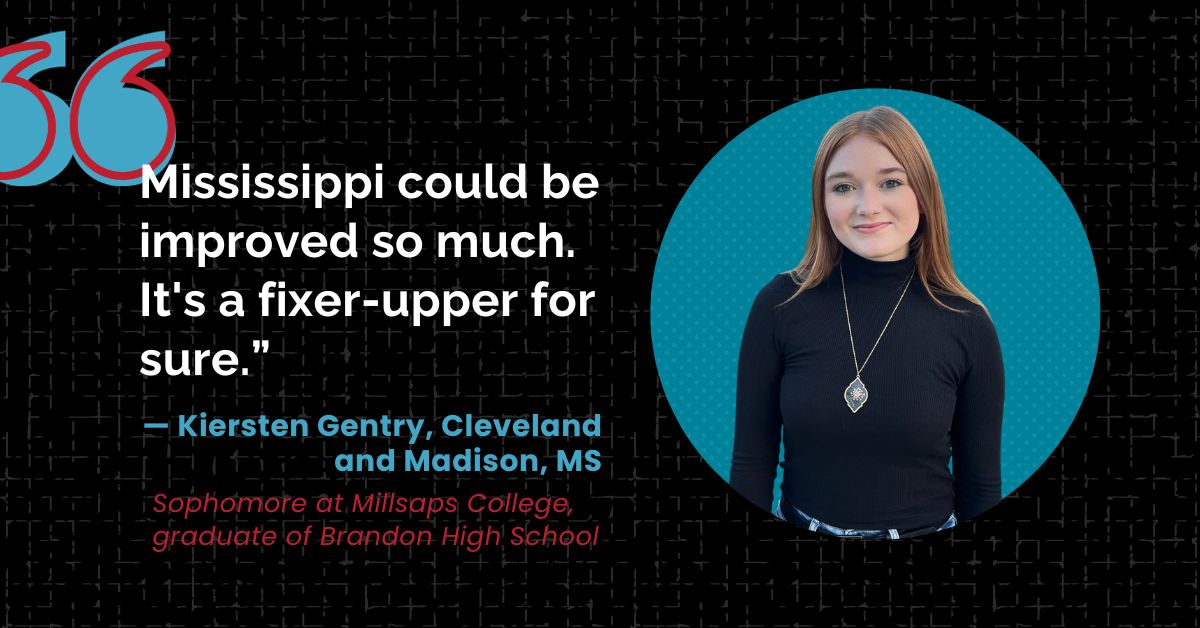
Taylor: You’re in your second year of college. How has it compared to what you expected?
Kiersten: I expected college to be, like, a lot harder. Kind of like keeping to myself. But I’ve joined a sorority, and I’ve really put myself out there and gotten out of my shell. So it’s been quite a good time.
Taylor: What are you studying?
Kiersten: I’m studying neuroscience and psychology. I love the fields I’m studying. They’re very interesting to me. For other people, they might be boring, but for me, I guess I’m a nerd for them.
Taylor: What led you toward that path?
Kiersten: I had a high school biology teacher who introduced me to the brain and the anatomy of it and how it works. And it just sparked a flame. And I just loved it ever since. And then my high school psychology teacher also did the same thing, introducing me to psychology. And since then, I just chose this major.
Taylor: So, shifting gears, how would you say you identify politically?
Kiersten: I was raised conservative, so I feel like on that aspect, I have to kind of follow them. But I also kind of align with some of the Democratic views as well.
Taylor: Are there any specific issues where your views are different from your parents’ views?
Kiersten: The abortion issue. I believe my view is very different. I am pro-life. I do wish that all children could have a life. But I also don’t believe you should force a woman to carry a child to term if she cannot financially support that child or if the child was a product of rape or anything like that where it could just bring up a lot of PTSD and trauma for her.
Homosexuality, that’s also been a big thing. Like gay marriage. I don’t know why that was such a big thing in my family, but that just kind of causes a divide, especially when I’m trying to debate with them. Like, this is everyone else’s life. If it’s not affecting you, it’s fine.
Taylor: When you say that, what do they say in reply?
Kiersten: They’re really Christian. And so we all see things a certain way than people who aren’t Christians do. So, for me it’s like, okay, yes, I see what they’re doing, but I’m not going to go and condemn them to hell for it. For them, they’re just very judgmental about it and they can’t just turn the other cheek. And I’m like, you’ve got to stop talking about people. You’ve got to stop judging.
Audio: Listen to Kiersten talk about issues on which her views differ from her parents.
Taylor: Thank you for sharing that. So you’re registered to vote. You’re 18 years old. You’re finally going to be able to cast your ballot. Why is voting important to you?
Kiersten: I want my voice to be heard. I think everyone should be able to have a voice, as many people don’t have voices until they’re 18, and then they turn 18, and it’s like a switch flips. So I want to know that my vote matters and that it’s seen and my voice is heard. Whether or not that candidate becomes governor or not, I just think it really matters that someone’s voice is heard.
Taylor: What are the issues that are on your mind that really matter to you?
Kiersten: The political divide. It’s either like people are super conservative or they’re super liberal and there’s no like… what’s the word? Blending in a way. It’s like conservatives are always out for liberals, and liberals are always picking on conservatives. It’s never like we all just join as one and they accept each other for who they are and their opinions and their views. And I think that’s the main thing with me is I just want to see the divide shift into a blend.
Taylor: Have you made up your mind yet about who you’re voting for?
Kiersten: I have not. I think I need to do a little more research on who I want to vote for and not just go with what my parents are voting for. But, yeah, I think I should do a lot more research on it, figure it out, and pick which party I like.
Taylor: Do you think that you will stay in Mississippi after college?
Kiersten: I don’t believe so. I think I want to move to Tennessee and practice medicine there eventually. My family is here. I love them, and I do want to be close to them. But I feel like there are greater opportunities in other states than Mississippi.
Taylor: What are the things that you like about Mississippi?
Kiersten: I love deer hunting here. I love the people here — most of them. Some can be very bold about their opinions, but I do love the people here. I love fishing, catfish. The food is amazing. It could be improved so much. It’s a fixer upper for sure. But in the end, this is where we’re from and it kind of sets in a sense of native-ness. It sets in like, this is where you’re from and this is your home. So it just brings back childhood memories or any fond experience you’ve had here.
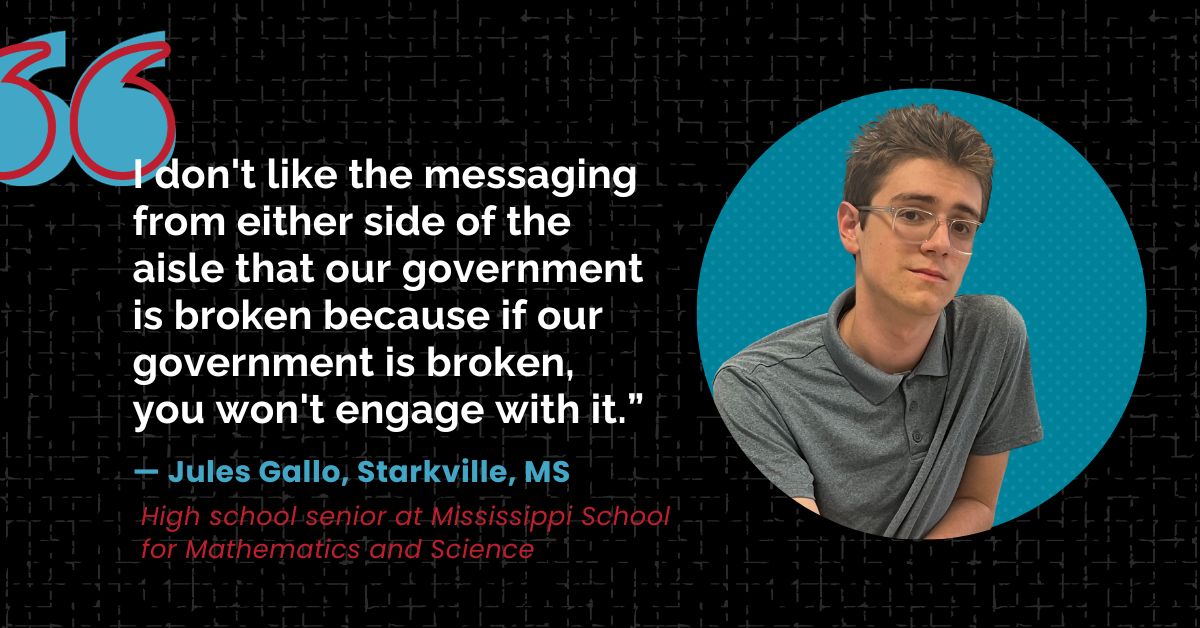
Taylor: I grew up in Oxford, but I won’t hold the Starkville thing against you. We can be cordial here.
Jules: (laughs)
Taylor: Jules, in terms of politics, how would you classify yourself?
Jules: I would call myself an informed liberal. There is a difference, in my opinion, in having left wing beliefs and being left wing sensationalist. So, there are members of my own generation on social media — I don’t have social media — who, for instance, will say that we live in a fascist state or whatever. Their politics might line up with mine, but their reactions to the world are not mine. I don’t find myself personally connected with members of my generation who believe that we need to blow up our political system.
Taylor: That’s really interesting. So what I hear you saying is you’ve observed a disconnect between the rhetoric that sometimes gets used on the left and the actual policies that folks want to see.
Jules: Yeah. I find that that sort of rhetoric, to be honest with you, sort of shows people’s hands of not actually understanding their government because they’re hearing reactionism from their own feeds, and then they’re spewing it and making it sound even more reactionist because they know even less about what’s actually happening.
Taylor: What are the issues that are most important to you as a voter?
Jules: Access to vote, education and healthcare are going to be my big three.
The first one, access to vote, is just extremely important to me because I’ve seen what turnout could do. It was extremely easy for me to register to vote in Oktibbeha County. I’m able to drive home that Tuesday to vote in Starkville because we’re in Columbus. People who live on the Coast or in the Delta or even in Jackson, they can’t do that. And some people, they didn’t even get their absentee ballots by the time Election Day happened last year. And that to me is just not okay because it makes it so our voices aren’t heard. So that’s my first issue.
My second one is education. I’m currently in high school. Obviously it’s going to affect me a lot. All credit to Governor Reeves for the $5,000 teacher pay raise he did a couple of years ago. It was incredible when I found that out, and it directly affected my teachers at the time back at Starkville High School. Access to education, access to higher teacher pay, teacher resources, those are the kind of things that will help Mississippi grow into a place that is more respectable.
And the third thing that I’m really interested in is health care. Mississippi is one of the most obese states. Mississippi is one of the poorest states. So having access to better quality health care is really important to me. The Medicaid expansion is an easy one. I was really happy to see Commissioner Presley talking about how he would expand it. There are people in my school whose families would directly benefit from expansion of Medicaid.
Taylor: The 18-24 year-old voter turnout in the last statewide election was really low. I believe around 19%. What’s it going to take to change that?
Jules: People caring about their government and not being told that their government is broken. I don’t like the messaging from either side of the aisle that our government is broken because if our government is broken, you won’t engage with it.
Taylor: Let’s talk about the two guys that are running for governor this year. We can start with Governor Reeves. What do you like about Governor Reeves and what do you not like as much?
Jules: I mentioned before, the teacher pay increase was a big deal. I respect him for that. I think the way he handled COVID was not perfect, but considering the fact that he had to toe the party line, I think he did a good job of at least trying to keep Mississippians safe in his own way.
Why hasn’t he expanded Medicaid? Why not? I don’t get it. That’s the first thing I dislike. It’s something that he could sign away. It’s on the governor. It’s not on the state legislature.
I don’t like any laws that he signed that would restrict the right to vote. There have been a couple of those in Mississippi. And I mean, his attorney general being the person to finally overturn Roe v. Wade, and then we have a full abortion ban now. I’m not a huge fan of that. I don’t think he has been the worst governor in the history of Mississippi. But I will say one last genuine problem is the welfare scandal. No one knows how involved he was in the welfare scandal, but he obviously knew about it and never spoke against it. So, that’s a really big deal to me.
Taylor: How about Brandon Presley?
Jules: I’ll start with what I don’t like about him. I am not a huge fan of his rhetoric on LGBTQ rights. I’m straight, but a lot of people at my school are really happy that MSMS is a place where they can be themselves in any way, shape or form. And I am really happy about that for them. And he’s been wishy-washy on things like transgender rights. The fact that he’s being a little politician-y about it is frustrating.
What I like about Commissioner Presley, the Medicaid expansion is really huge. I like his commitment to investing in infrastructure. That’s sort of the backbone of Mississippi’s economy, especially since Mississippi is a shrinking population state. If people at my school were asked a question of how many of you plan to leave, 95% of them would raise their hands. I’m one of them. I’m not going to lie. But it’s just a sad reflection of our state. And I think he’s made a couple commitments to try and change that, which I really appreciate. And I’m really supportive of what he’s done as a public service commissioner in getting the state high-speed Internet access, especially during COVID.
Audio: Listen to Jules explain what he does and doesn’t like about Reeves and Presley.
Taylor: If you had a chance to sit down with these two guys, what advice would you give them?
Jules: I’d tell Commissioner Presley that if he wants to win, he has to understand that there’s a group of people that will never vote for him because there’s a D next to his name. Trying to convince them is futile. So, he would be better off trying to turn out young voters, Black voters. I read on FiveThirtyEight that Mississippi’s voter turnout is the most polarized by race in the country. 90% of white voters vote Republican. 90% of Black voters vote Democrat. Whether or not he wins is completely up to turnout at this point.
To Governor Reeves, I’d tell him if he keeps doing these reactionary politics, it probably brings him victory in the sense that it fires up the white, conservative, Christian base. I just wish that he put more substance behind his campaign as well. I wish there was more on his own campaign website and in his own rhetoric about what he’s going to do to actually fix the problems that Mississippi has instead of focusing on the problems that affect such a small percent of the population.
Taylor: So, Jules, you’re a senior in high school right now. What are your plans for the future?
Jules: I have submitted applications for both Mississippi State and Ole Miss. And the decision of whether or not I attend will be whether or not I can afford a school outside of the state. And that’s how it is. That’s how it is for all of us here at MSMS. And my reflection on that is, why are we living in a state where our best options are safeties? So, even as someone who is really excited to vote in November, I’m looking around and saying, depending on where I am next year, this might be one of the few times in my life I actually vote in my home state.
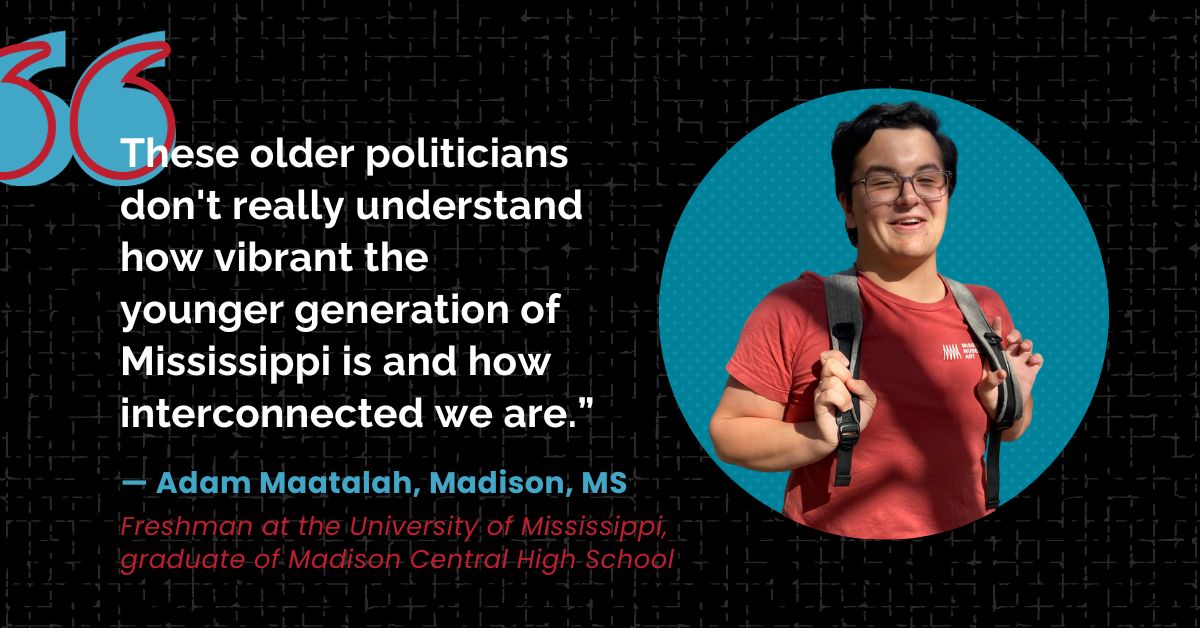
Taylor: To get started, why is voting important to you?
Adam: I feel like it’s a part of our civic duty to be engaged in politics. And I know a lot of people might feel that they’re too cool to be involved in politics, or it might be boring. But I think it’s important to vote because we have such a diverse and large generation that we need to enact change within our government.
Taylor: What would you say are the most important issues as you head to the polls in November?
Adam: Off the bat, I think if you want to attract young people to the polls, you need to talk more about education policies. I think that access to college needs to be taken a greater look at. Rural communities don’t all have access to broadband Internet, let alone access to good school supplies and materials needed to get to higher education.
And then also hospitals. It may seem weird coming from a young person to think about hospitals, but I mean, if you want to attract people to come here and stay in the state, you’ve got to look at long-term health. So when I see that there’s only one children’s hospital in the entire state and all these rural hospitals are shutting down or going bankrupt, it’s something that doesn’t really appeal to me as a young person.
My third thing would definitely be LGBTQ rights. I’m actively open as a gay man within my community, and I think that it’s been really hard trying to coexist with other people, let alone these policies that the Mississippi state legislature has been enacting and Governor Tate Reeves has been signing — especially when talking about trans rights and and even local school boards and local city councils banning books. It’s definitely been a hard existence as a gay man in Mississippi.
Lastly, I would say environmental justice. I think that Mississippi needs to move towards more green energy. Mississippi has great access to water, renewable energy. We have the Mississippi River. We have lots of rain here as well.
Taylor: Are there personal experiences that you’ve had that have informed your political views?
Adam: The memories of being bullied in elementary and middle school and being treated like an outsider has shaped my perspective on LGBTQ policies. And also when I went to the Madison County school district meeting, there was a woman talking about how books that have queer representation were somehow explicit materials, that they were basically pornography in a sense. That moment struck me as how disassociated some people can be from reality and how we call ourselves the hospitality state, but it’s hospitality for a select few.
Taylor: As you think about the older generations that are in power in Mississippi, are there things that they don’t understand about young Mississippians?
Adam: I think that these older politicians don’t really understand how vibrant the younger generation of Mississippi is and how interconnected we are. Politicians tend to divide us up, but I think that the younger generation in Mississippi is collectively strong. We want to have fun and thrive and be youthful.
Taylor: Thinking about the two candidates for governor, what do you know about them?
Adam: I know that Tate Reeves used to be the lieutenant governor. He’s been in the Mississippi politics game for a very long time now. But I also know that he’s one of the most unpopular governors in the whole nation. And he was also governor during the Black Lives Matter protest, and was strongly against them even though Mississippi’s probably one of the core states that should recognize those issues. Another thing about Tate Reeves that I’ve kind of taken an “ick” towards is his school choice initiative. I think that that policy overall diminishes the importance of public schools and the funding required for public schools.
As far as Brendon Presley goes, I’m not entirely sure of his background. One thing I will say about him that I’m kind of skeptical about is his trans rights stance. I remember him coming out about how he wasn’t going to reverse those policies and how it just really hurt me. I can kind of see how that’s a sacrifice he has to make to appeal to the Republican base in Mississippi, but it definitely does hurt.
Taylor: Are you so hurt that you would not vote for him? How do you think about that?
Adam: You know, I think that there’s an urge to do that. But at the end of the day, I think it’s more responsible and more adult-like to go out and vote regardless of what you don’t like about the candidate. I kind of see it as like the lesser of two evils, to be honest.
Taylor: If you could sit down with the two candidates, what would you tell them?
Adam: Why aren’t you listening? Honestly, both of them. Why? Why aren’t you listening? I know the majority of Mississippi may feel a certain way about certain issues, but that doesn’t mean there can’t be compromise. And I think that’s something that this Republican-led state legislature doesn’t really understand. Like, it really does feel like my voice is just nowhere. It’s nowhere in state government. I would also tell them that you need to look at younger people with a more keen eye because we’re going to be here after y’all leave.
Audio: Listen to Adam share what he would tell Tate Reeves and Brandon Presley.
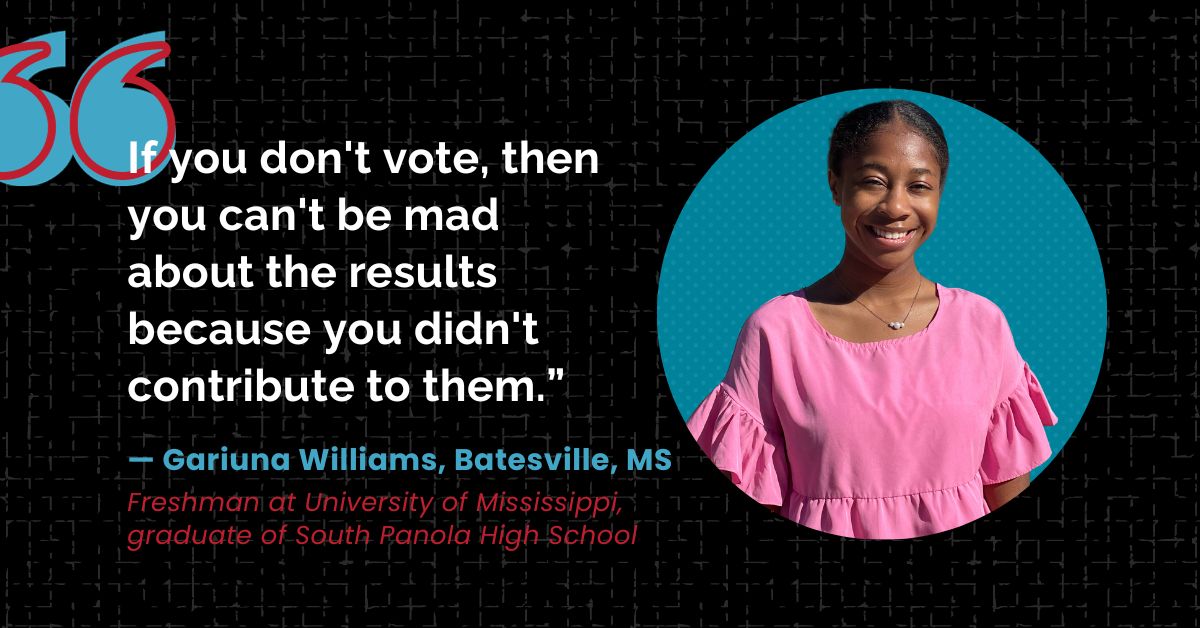
Taylor: To kick things off, can you tell me a little bit about yourself?
Gariuna: I’ve just been a country girl all my life. I love to go four-wheeler riding and horses and all that type of stuff and fishing. I’d rather do that than go out to the city somewhere, like going to the movies or something.
Taylor: Tell me more about where you live and what it looks like.
Gariuna: Well, I’m just going to give you a little idea. You can literally be driving down the road and you’ll see a tractor driving right beside you or in front of you. And you have to sit there waiting patiently until you can go around it. And there’s a lot of fields everywhere you look, and there’s poor phone service.
Taylor: Up until now, what has your relationship with politics been like?
Gariuna: Well, I’ve actually seen what really happens because I went to the Capitol and I was a page for the Senate. So I got to see what happened firsthand. And I got to see them actually make decisions for the state of Mississippi.
Taylor: So you were working for your local senator?
Gariuna: Yes, Robert Jackson.
Taylor: What were your impressions of the Senate chamber and how it all worked?
Gariuna: It was actually very chaotic. The first couple of days, I was like, Oh, my gosh, what is this? But it’s actually a very good experience. They’ll go through their agenda and then somebody will have a motion for a new law that they want to pass and then they’ll vote on it. But most of the time it doesn’t it doesn’t get approved because not many people agree on it. And then they just move on to the next one.
Taylor: Is voting a big tradition in your family?
Gariuna: Yes, my mom made sure that I got registered as soon as I turned 18 because it’s very important that if you want to see change in the community or if you want something to happen, then you need to go vote. If you don’t vote, then you can’t be mad about the results because you didn’t contribute to them.
Taylor: What are the things that you want to see change in Mississippi?
Gariuna: I definitely want to see the poverty rates improve. And just like the help overall in the state of Mississippi because Mississippi is generally known as a poor state. We’re all dumb. We don’t know anything. I just want people to get into office and spark change in Mississippi as a whole to where we won’t have that bad name as we normally do.
Audio: Listen to Gariuna describe what she wants to see change in her hometown.
Taylor: What were the opportunities for young people in and around Batesville? What did you guys do outside of school?
Gariuna: There’s actually not many opportunities in the Batesville area at all. That’s why I think the crime has sparked over the past couple of years because we have to go to Oxford or Southaven to have fun. We always have to drive somewhere to do anything because there’s nothing here for us to do. We used to have a Boys and Girls Club, but they shut it down and I feel like that kept a lot of people out of trouble. And now that’s just gone.
Taylor: What do you know about the candidates running for governor?
Gariuna: Well, I know Tate Reeves, because I’ve actually met him.
Taylor: Tell me tell me more about that.
Gariuna: Well, it wasn’t really a good experience. It was when I was paging at the Capitol. We just all went to go take a picture with him. And he wasn’t really like — you know how some people, you meet them, they kind of try to make conversation with you and try to let you know that they care? — he just kind of gave me a handshake and just took the picture. He’s like, Hey, how are you? And then just grabbed my hand, took the picture like he was just trying to get on with his day. Like he didn’t really care for what was going on. He just wanted to finish it.
Taylor: So maybe not the best first impression.
Gariuna: No, not at all.
Taylor: What are some things that you think these candidates can do to better reach young people with their messages?
Gariuna: To get in tune with younger kids, you need to come to their level and see what they’re interested in and do that with them. Maybe do a little pop-ups at schools and see what’s actually going on and plan a couple events. If you do fun events with kids, they’ll love you as soon as it happens. You’ve just got to be there and show that you care.
Taylor: Is there anything else that you want to share?
Gariuna: I just want to say that I’m hoping and praying that change happens in this state.
This article first appeared on Mississippi Today and is republished here under a Creative Commons license.
Mississippi Today
Central, south Mississippi voters will decide judicial runoffs on Tuesday

Some Mississippi voters head to the polls Tuesday to decide who should represent them on the state’s highest courts.
Polls will be open from 7 a.m. to 7 p.m. on Tuesday. Absentee voting has begun, and in-person absentee voting at county circuit clerk’s offices ends at noon on Saturday.
In the Jackson Metro area and parts of central Mississippi, incumbent Supreme Court Justice Jim Kitchens will compete against Republican state Sen. Jenifer Branning of Neshoba County. In areas on the Gulf Coast, Jennifer Schloegel and Amy St. Pé will face each other for an open seat on the Court of Appeals.
Candidates for judicial offices in Mississippi are technically nonpartisan, but political parties and trade associations often contribute money to candidates and cut ads for them, which has increasingly made them almost as partisan as other campaigns.
In the Central District Supreme Court race, GOP forces are working to oust Kitchens, one of the dwindling number of centrist jurists on the high Court. Conservative leaders also realize Kitchens is next in line to lead the court as chief justice should current Chief Justice Mike Randolph step down.
Kitchens is one of two centrist members of the high court and is widely viewed as the preferred candidate of Democrats, though the Democratic Party has not endorsed his candidacy.
Kitchens, first elected to the court in 2008, is a former district attorney and private-practice lawyer. On the campaign trail, he has pointed to his experience as an attorney and judge, particularly his years prosecuting criminals and his rulings on criminal cases.
In an interview on Mississippi Today’s ‘The Other Side’ podcast, Kitchens said his opponent, who primarily practices real estate law, would be at a “significant disadvantage” because the state Supreme Court often reviews criminal cases and major civil lawsuits that are sent to them on appeal.
“I’m sure she has an academic knowledge about the circuit courts that she perhaps learned in law school or perhaps has been to some seminars, but she does not have the hands-on trial experience that I have,” Kitchens said. “And that’s so important to the work that I do.”
Branning, a private-practice attorney, was first elected to the Legislature in 2015. She has led the Senate Elections and Transportation committees. During her time at the Capitol, she has been one of the more conservative members of the Senate leadership, voting against changing the state flag to remove the Confederate battle emblem, voting against expanding Medicaid to the working poor and supporting mandatory and increased minimum sentences for crime.
While campaigning for the judicial seat, she has pledged to ensure that “conservative values” are always represented in the judiciary, but she has stopped short of endorsing policy positions — which Mississippi judicial candidates are prohibited from doing.
Branning declined an invitation to appear on Mississippi Today’s podcast.
“Mississippians need and deserve Supreme Court justices that are constitutionally conservative in nature,” Branning said in a recent interview with radio station SuperTalk Mississippi. “And by that, I mean justices that simply follow the law. They do not add or take away.”
The two candidates have collectively raised around $187,00 and spent $182,00 during the final stretch of the campaign, according to campaign finance reports filed with the Secretary of State’s office.
Since she initially qualified in January, Branning has raised the most amount of money at $879,871, with $250,000 of that money coming from a loan she gave her campaign. She spent around $730,000 of that money. Several third party groups have supported her campaign.
Kitchens has raised around $514,00 since he qualified for reelection. He’s spent roughly $436,000 of that money, and some of his top contributors have been trial attorneys.
For the open Court of Appeals seat, Schloegel and St Pe, two influential names on the Gulf Coast, are working to turn out their voters in a close election.
Schloegel is a Chancery Court judge in Harrison, Hancock and Stone counties. St. Pé is an attorney in private practice, a municipal court judge in Gautier, and a city attorney for Moss Point.
Schloegel has raised roughly $214,000 since she qualified, and has spent almost that same amount of money this election cycle. St. Pé has raised around $480,000 this year and spent approximately $438,067 during that timeframe.
Whoever wins the race, it ensures that a woman will fill the open seat. After the election, half of the judges on the 10-member appellate court will be women, the most number of women who have served on the court at one time.
This article first appeared on Mississippi Today and is republished here under a Creative Commons license.![]()
Mississippi Today
On this day in 1961


Nov. 22, 1961

Five Black students, made up of NAACP Youth Council members and two SNCC volunteers from Albany State College, were arrested after entering the white waiting room of the Trailways station in Albany, Georgia.
The council members bonded out of jail, but the SNCC volunteers, Bertha Gober and Blanton Hall declined bail and “chose to remain in jail over the holidays to dramatize their demand for justice,” according to SNCC Digital Gateway. The president of Albany State College expelled them.
Gober became one of SNCC’s Freedom Singers and wrote the song, “We’ll Never Turn Back,” after the 1961 killing of Herbert Lee in Mississippi. The tune became SNCC’s anthem.
After her release from jail, Gober joined other students, and police arrested her and other demonstrators. Back in the same jail, she sang to the police chief and mayor to open the cells, “I hear God’s children praying in jail, ‘Freedom, freedom, freedom.’”
Albany State suspended another student, Bernice Reagon, after she joined SNCC. She poured herself into the civil rights movement and later formed the Grammy-nominated a cappella group Sweet Honey in the Rock to educate and empower the audience and community.
“When I opened my mouth and began to sing, there was a force and power within myself I had never heard before,” a power she said she did not know she had.
Other members of the Freedom Singers included Cordell Reagon, Bernice Johnson, Dorothy Vallis, Rutha Harris, Bernard Lafayette and Charles Neblett. On the third anniversary of the sit-in movement in 1963, they performed at Carnegie Hall.
“This is a singing movement,” SNCC leader James Forman told a reporter. “The songs help. Without them, it would be ugly.”
Today, the Albany Civil Rights Institute houses exhibits on these protesters, Martin Luther King Jr. and others who joined the Albany Movement.
This article first appeared on Mississippi Today and is republished here under a Creative Commons license.![]()
Mississippi Today
IHL deletes the word ‘diversity’ from its policies

The governing board of Mississippi’s public universities voted Thursday to delete the word “diversity” from several policies, including a requirement that the board evaluate university presidents on campus diversity outcomes.
Though the Legislature has not passed a bill targeting diversity, equity and inclusion initiatives in higher education, the Institutions of Higher Learning Board of Trustees approved the changes “in order to ensure continued compliance with state and federal law,” according to the board book.
The move comes on the heels of the re-election of former President Donald Trump and after several universities in Mississippi have renamed their diversity offices. Earlier this year, the IHL board approved changes to the University of Southern Mississippi’s mission and vision statements that removed the words “diverse” and “inclusiveness.”
In an email, John Sewell, IHL’s communications director, did not respond to several questions about the policy changes but wrote that the board’s goal was to “reinforce our commitment to ensuring students have access to the best education possible, supported by world-class faculty and staff.”
“The end goal is to support all students, and to make sure they graduate fully prepared to enter the workforce, hopefully in Mississippi,” Sewell added.
On Thursday, trustees approved the changes without discussion after a first reading by Harold Pizzetta, the associate commissioner for legal affairs and risk management. But Sewell wrote in an email that the board discussed the policy amendments in open session two months ago during its retreat in Meridian, more than an hour away from the board’s normal meeting location in Jackson.
IHL often uses these retreats, which unlike its regular board meetings aren’t livestreamed and are rarely attended by members of the public outside of the occasional reporter, to discuss potentially controversial policy changes.
Last year, the board had a spirited discussion about a policy change that would have increased its oversight of off-campus programs during its retreat at the White House Hotel in Biloxi. In 2022, during a retreat that also took place in Meridian, trustees discussed changing the board’s tenure policies. At both retreats, a Mississippi Today reporter was the only member of the public to witness the discussions.
The changes to IHL’s diversity policy echo a shift, particularly at colleges and universities in conservative states, from concepts like diversity in favor of “access” and “opportunity.” In higher education, the term “diversity, equity and inclusion” has traditionally referred to a range of efforts to comply with civil rights laws and foster a sense of on-campus belonging among minority populations.
But in recent years, conservative politicians have contended that DEI programs are wasteful spending and racist. A bill to ban state funding for DEI in Mississippi died earlier this year, but at least 10 other states have passed laws seeking to end or restrict such initiatives at state agencies, including publicly funded universities, according to ABC News.
In Mississippi, the word “diversity” first appeared in IHL’s policies in 1998. The diversity statement was adopted in 2005 and amended in 2013.
The board’s vote on Thursday turned the diversity statement, which was deleted in its entirety, into a “statement on higher education access and success” according to the board book.
“One of the strengths of Mississippi is the diversity of its people,” the diversity statement read. “This diversity enriches higher education and contributes to the capacity that our students develop for living in a multicultural and interdependent world.”
Significantly, the diversity statement required the IHL board to evaluate the university presidents and the higher learning commissioner on diversity outcomes.
The statement also included system-wide goals — some of which it is unclear if the board has achieved — to increase the enrollment and graduation rates of minority students, employ more underrepresented faculty, staff and administrators, and increase the use of minority-owned contractors and vendors.
Sewell did not respond to questions about if IHL has met those goals or if the board will continue to evaluate presidents on diversity outcomes.
In the new policy, those requirements were replaced with two paragraphs about the importance of respectful dialogue on campus and access to higher education for all Mississippians.
“We encourage all members of the academic community to engage in respectful, meaningful discourse with the aim of promoting critical thinking in the pursuit of knowledge, a deeper understanding of the human condition, and the development of character,” the new policy reads. “All students should be supported in their educational journey through programming and services designed to have a positive effect on their individual academic performance, retention, and graduation.”
Also excised was a policy that listed common characteristics of universities in Mississippi, including “a commitment to ethnic and gender diversity,” among others. Another policy on institutional scholarships was also edited to remove a clause that required such programs to “promote diversity.”
“IHL is committed to higher education access and success among all populations to assist the state of Mississippi in meeting its enrollment and degree completion goals, as well as building a highly-skilled workforce,” the institutional scholarship policy now reads.
The board also approved a change that requires the universities to review their institutional mission statements on an annual basis.
A policy on “planning principles” will continue to include the word “diverse,” and a policy that states the presidential search advisory committees will “be representative in terms of diversity” was left unchanged.
This article first appeared on Mississippi Today and is republished here under a Creative Commons license.![]()
-

 Local News6 days ago
Local News6 days agoCelebrate the holidays in Ocean Springs with free, festive activities for the family
-
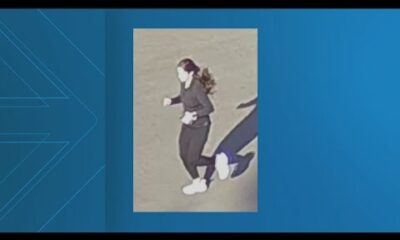
 News from the South - Georgia News Feed7 days ago
News from the South - Georgia News Feed7 days ago'Hunting for females' | First day of trial in Laken Riley murder reveals evidence not seen yet
-

 News from the South - Alabama News Feed7 days ago
News from the South - Alabama News Feed7 days agoFirst woman installed as commanding officer of NAS Pensacola
-

 Kaiser Health News4 days ago
Kaiser Health News4 days agoA Closely Watched Trial Over Idaho’s Near-Total Abortion Ban Continues Tuesday
-

 Mississippi Today6 days ago
Mississippi Today6 days agoOn this day in 1972
-

 News from the South - Alabama News Feed3 days ago
News from the South - Alabama News Feed3 days agoTrial underway for Sheila Agee, the mother accused in deadly Home Depot shooting
-

 News from the South - Georgia News Feed2 days ago
News from the South - Georgia News Feed2 days agoJose Ibarra found guilty in murder of Laken Riley | FOX 5 News
-

 News from the South - Alabama News Feed3 days ago
News from the South - Alabama News Feed3 days agoAlabama's weather forecast is getting colder, and a widespread frost and freeze is likely by the …































